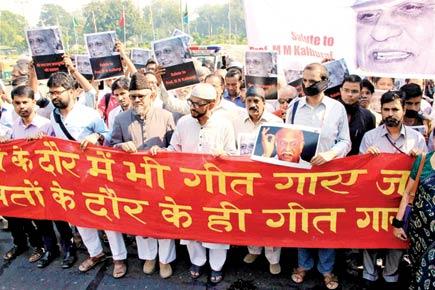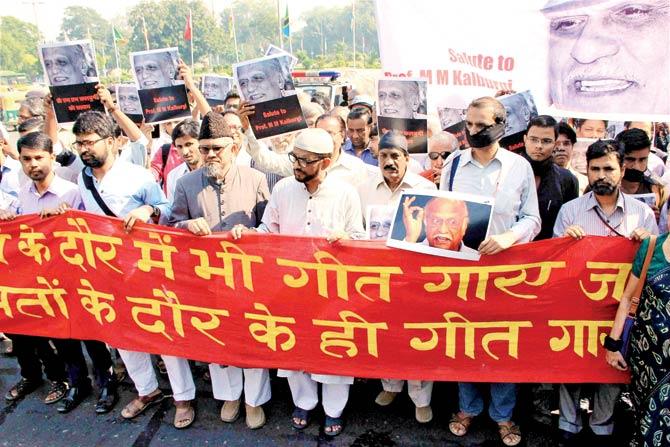History has shown that societies benefit with dissent, not conformity

 History has shown that societies benefit with dissent, not conformity. People speak up, they are heard, opinions are formed, laws are modified, norms change for the better, people become more informed... all because we argue and disagree with each other. Discussion is merely another form of dissent. True patriotism is not abject compliance. In functional democracies, it is also protection of dissent arising from minority voices.
History has shown that societies benefit with dissent, not conformity. People speak up, they are heard, opinions are formed, laws are modified, norms change for the better, people become more informed... all because we argue and disagree with each other. Discussion is merely another form of dissent. True patriotism is not abject compliance. In functional democracies, it is also protection of dissent arising from minority voices.
ADVERTISEMENT

Making a point: Writers and activists on a solidarity march with black gags and arm bands in New Delhi on Friday, after which the Sahitya Akademi condemned the murder of MM Kalburgi. Pic/PTI
It is hard to accept it if you are in a managerial position or if you are running a government. Top down managers have a brief to crush dissent because smooth functioning they are told is when every part is well oiled and works in sync. Round pegs cannot fit in square holes. Find the right fit for all and see that unification of opinion happens without laying out the riot act. If necessary, do that too.
In a democracy it is not just the right but also the duty of several sections of society to dissent. The media is first and foremost. It is their job to ask the uncomfortable questions. A columnist recently criticised a reporter for having asked Rahul Gandhi if his visit to the village where Dalit kids were burned alive, was a photo-op. If the columnist had seen the video he would have got a clearer picture. The reporter asked for Rahul Gandhi’s opinion to the BJP’s allegation that his visit was a photo-op. Mr Gandhi was livid that the question was even asked of him, he lambasted the BJP and after the first angry 30 seconds, he figured that the reporter was not to blame. It was her duty to ask that question. Don’t blame the messenger! A similar situation occurred in Canada where prime minister-elect Justin Trudeau shushed up his supporters who booed a reporter for asking a tough question. It is the reporter’s job in a democracy, he reminded his supporters.
In the past few weeks, several writers and artistes have returned their state awards in protest against rising intolerance in society. You may or may not agree with their manner of protest, even blame them for their political affiliations, but the fact is that it is a legitimate manner of protest.
Gentler voices must be heard else they become loud and harsh. And sometimes violent. Vice-President Dr Hamid Ansari said recently, “In a democratic society, including ours, the need to accept difference of opinion is an essential ingredient of plurality. In that sense, the right of dissent also becomes the duty of dissent since tactics to suppress dissent tend to diminish the democratic essence.”
President Pranab Mukherjee too spoke about the need for tolerance and ability to accept plurality. These are men of intellect who have experienced and dealt with dissent in politics and government. Disagreeing, resolving and accommodating dissenting voices are a process that lawmakers need to adopt.
Civil society’s role is diminished in a democracy if its voice is stifled. When stifled, dissenting voices will find a way to be heard and in an angry manner. Amplification could lead to anarchist movements. The Maoist movement and insurgencies in several parts of our country are largely voices which were not heard when they should have been.
Russia and China have legislated laws to crush alternative opinions. In Pakistan, there is an iron curtain on reporting voices of the Baloch, Ahmedis, Shia minorities, PoK residents and several others.
Suppressing voices of dissent will not aid in improving our democracy, nor our global image. The world respects a country where there is plurality of opinion and respect of it. The world fears China’s growth and has grudging respect for its economic and military might. But it has far greater respect for the struggle that India goes through almost on a daily basis to achieve similar success while being a democracy with its flaws... warts and all.
If there is a sense of unease in our polity today, hammering in a consensus is not the way out.... instead, it is necessary to go through the democratic journey of negotiation, collaboration on alternatives and then arrive at a workable relationship. That is what democracies do best. Each one at its own pace.
We are a country with a rich history of dissenters. From the Mahavira to Buddha, Raja Rammohan Roy to Lokmanya Tilak, Gandhi to Bose, Ambedkar to Vinobha Bhave. Each bucked trends and taught us new ways of finding solutions to old problems. Let us foster more diverse opinions and be a country that promotes freethinking.
Smita Prakash is Editor, News at Asian News International. You can follow her on Twitter @smitaprakash
 Subscribe today by clicking the link and stay updated with the latest news!" Click here!
Subscribe today by clicking the link and stay updated with the latest news!" Click here!






